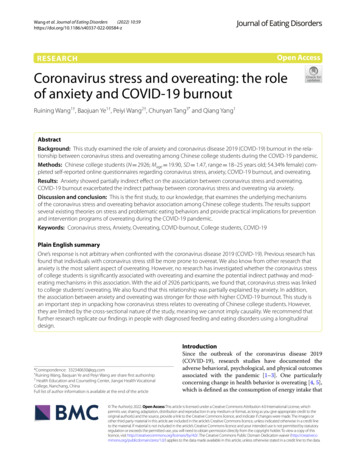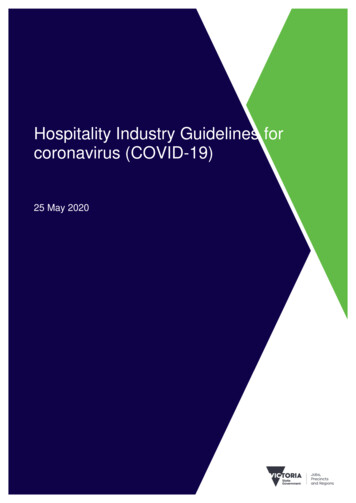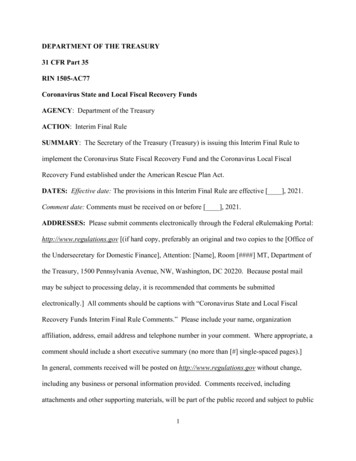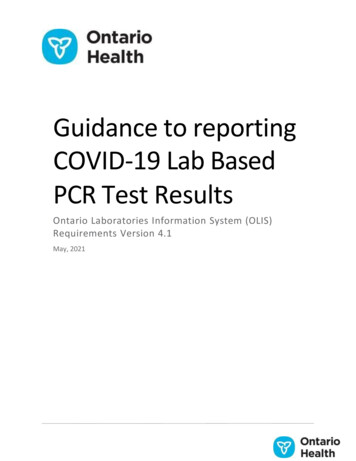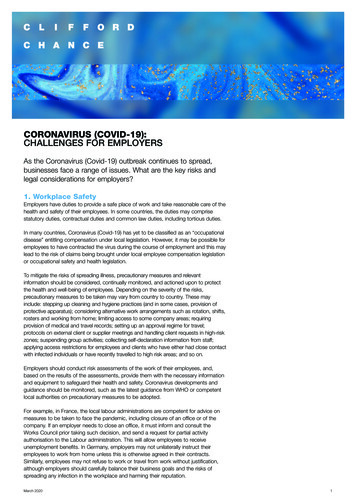
Transcription
CORONAVIRUS (COVID-19):CHALLENGES FOR EMPLOYERSAs the Coronavirus (Covid-19) outbreak continues to spread,businesses face a range of issues. What are the key risks andlegal considerations for employers?1. Workplace SafetyEmployers have duties to provide a safe place of work and take reasonable care of thehealth and safety of their employees. In some countries, the duties may comprisestatutory duties, contractual duties and common law duties, including tortious duties.In many countries, Coronavirus (Covid-19) has yet to be classified as an “occupationaldisease” entitling compensation under local legislation. However, it may be possible foremployees to have contracted the virus during the course of employment and this maylead to the risk of claims being brought under local employee compensation legislationor occupational safety and health legislation.To mitigate the risks of spreading illness, precautionary measures and relevantinformation should be considered, continually monitored, and actioned upon to protectthe health and well-being of employees. Depending on the severity of the risks,precautionary measures to be taken may vary from country to country. These mayinclude: stepping up cleaning and hygiene practices (and in some cases, provision ofprotective apparatus); considering alternative work arrangements such as rotation, shifts,rosters and working from home; limiting access to some company areas; requiringprovision of medical and travel records; setting up an approval regime for travel;protocols on external client or supplier meetings and handling client requests in high-riskzones; suspending group activities; collecting self-declaration information from staff;applying access restrictions for employees and clients who have either had close contactwith infected individuals or have recently travelled to high risk areas; and so on.Employers should conduct risk assessments of the work of their employees, and,based on the results of the assessments, provide them with the necessary informationand equipment to safeguard their health and safety. Coronavirus developments andguidance should be monitored, such as the latest guidance from WHO or competentlocal authorities on precautionary measures to be adopted.For example, in France, the local labour administrations are competent for advice onmeasures to be taken to face the pandemic, including closure of an office or of thecompany. If an employer needs to close an office, it must inform and consult theWorks Council prior taking such decision, and send a request for partial activityauthorisation to the Labour administration. This will allow employees to receiveunemployment benefits. In Germany, employers may not unilaterally instruct theiremployees to work from home unless this is otherwise agreed in their contracts.Similarly, employees may not refuse to work or travel from work without justification,although employers should carefully balance their business goals and the risks ofspreading any infection in the workplace and harming their reputation.March 20201
CORONAVIRUS (COVID-19): CHALLENGES FOR EMPLOYERS2. Knock-on Effect: Pay, Paid Leave, Tax ImplicationsChanges to work arrangements may potentially have a knock-on effect on employees’pay, holiday and sick leave entitlements, particularly if employees are restrained fromundertaking certain work activities due to medical surveillance, compulsory quarantine,or self-quarantine, or are within restricted zones overseas.Generally, if an employee is ready, willing and able to perform their work, and work canbe performed remotely from home, the employee should be paid in the usual way. If anemployee’s inability to work is the result of government decision or external constraints,the position is less clear and the practical implications would be jurisdiction specific.Similarly, if, following a holiday or business trip, employees are stranded overseas as aconsequence of locally imposed travel or quarantine restrictions (e.g. in China or SouthKorea), employers and employees should discuss what safe travel options exist andthe possibility of remote working.Remote working in places outside of the employee’s usual place of work may have tax andwork visa implications, particularly if the arrangement stretches for months as opposed todays or weeks. Although some jurisdictions have exemptions where an individual spendstime (or more time than usual) in a jurisdiction in exceptional circumstances, these are notcomprehensive and will not necessarily apply, especially in cases where the remoteworking does not result from a government restriction on the employee returning to theirusual place of work. Employees may become subject to tax in the jurisdiction they areworking in on their employment income for that period or may even become tax resident inthat country. Employers will need to consider whether there are any withholding, reportingor social security obligations which they need to fulfil in respect of such employees.An individual’s presence or activities in a foreign jurisdiction may also cause corporatetax liabilities or reporting obligations to arise for the employer. Whether the individual’spresence or activities are such that these obligations would be triggered will differsignificantly from jurisdiction to jurisdiction (although the focus by many tax authoritieswill be on revenue-generating activities such as habitually signing contracts). Theseissues will be particularly difficult where very senior employees, and in particulardirectors, are involved. Any remote working arrangements should be carefullyconsidered in the context of the rules in the relevant jurisdiction (and any applicabledouble tax treaties). In some cases (particularly where an employee is expected to beoutside their home jurisdiction for an extended period), a secondment to another groupentity may be appropriate to mitigate risks in this area.For example, in Italy, some payment of taxes has been delayed and the Governmentmight decide to fund part of the compensation to be paid to employees suspended fromwork. In France, if quarantined employees are unable to work remotely, they can benefit,for a maximum 20-day period, by way of derogation, from daily social security benefits,even if they do not meet the normal conditions for entitlement to these benefits, providedthat they are identified by the Regional Health Agency. The French Labour Administrationmight also accept or decide to delay the payment of some taxes and social contributions.In Germany, if employees are willing and able to work but the company decides tosuspend its business, the employees will have the right to continue to receive their salary.However, if an employee is banned by the authorities from working for health reasons, theemployee may claim statutory compensation against the state, and the compensation willthen be paid by the employer and reimbursed by the state upon request.For workplace measures and travel advisories in response to Coronavirus, please referto the checklist below.2March 2020
CORONAVIRUS (COVID-19): CHALLENGES FOR EMPLOYERS3. Regulated Sectors: Key Persons and Qualified StaffFor banks and regulated financial institutions operating in cities where the outbreakis particularly serious, having appropriate team rotation and other risk managementarrangements would be particularly important, as there must be sufficient human andtechnical resources devoted to operational risk management to ensure that businessactivities are conducted by qualified staff with the necessary experience andtechnical capabilities.If key persons are stranded or if the entire team has contracted the virus, businessoperations would be severely hampered. Regulated entities that are required to havea business continuity plan should ensure that the business continuity plan sufficientlycovers such situations. Individual licensing issues, both for licensed staff and licensedcorporations, should also be considered.4. Data privacyCompanies are multiplying measures to prevent Coronavirus from contaminating theirpremises. These measures sometimes require them to collect, analyse and shareinformation about their employees and other individuals (e.g. customers, contractors).For instance, a company may wish to request employees and office visitors to provideinformation about their recent travels, exposure to potentially contaminated individuals,and/or symptoms, for the purpose of Coronavirus containment.Processing this personal data is usually necessary for the company to comply with healthand safety regulations. Nonetheless, it raises data protection challenges, in particular withrespect to the information of concerned individuals regarding what the companyenvisages to do with one’s personal data, types of personal data that it is permitted tocollect, conditions to process sensitive data such as health data, and circumstancesunder which such personal data can be shared within and outside the company’s group5. Unlawful Discrimination IssuesIf there is a legitimate cause, such as recent travel history or close contact withinfected persons, to require an employee to self-quarantine or stay away from theworkplace to prevent the spread of the virus, this may not amount to unlawfuldiscrimination, particularly if this is necessary for public health, and is statutorilyprovided for in some jurisdictions.For example, in Italy, in principle, persons residing or domiciled in the “quarantine”areas are banned from going to work even in workplaces outside those areas.In France, in the event of an epidemic, employers can compel employees to workremotely, and disciplinary sanctions can be imposed on them in the event of refusal.The company’s occupational physician and Works Council could be consulted onthis measure, which mitigates the risk of alleged discrimination. In Germany, if anemployee’s child falls ill with Covid19, the employee has a right to stay at home andcare for the child. In that event, the employee will either continue to receive salaryfrom the employer or benefits from the health insurance fund, depending on theterms of the contract.However, employers should be alert to, and deal promptly with, any acts ofdiscrimination and harassment of staff perceived to be from countries with highinfection rates by colleagues, clients and customers.March 20203
CORONAVIRUS (COVID-19): CHALLENGES FOR EMPLOYERSIn China, the PRC Ministry of Human Resources and Social Security issued a circularon 24 January 2020 prohibiting employers from terminating the employment of anyemployees who are infected by Coronavirus during their quarantined treatment(otherwise than for misconduct).In France, an employee may refuse a professional trip to China, or any zone at risk,on the basis of his right of withdrawal, provided that he or she has reasonablegrounds to believe that the work situation presents a serious and imminent dangerfor his or her health. The employer cannot sanction an employee who makes use ofhis right of withdrawal.Checklist – workplace safety Whether information has been provided, or reasonable protective or precautionarymeasures have been taken, to minimise the risks of spreading illness? For example,good hygiene practices, self-quarantine, referral for medical advice, approval regimefor business travel, protocols on external client or supplier meetings and handlingclient requests in high-risk zones, monitoring Coronavirus developments andguidance such as the latest guidance from WHO or other competent local authoritieson precautionary measures to be adopted. Whether there is a need to consider alternative work arrangements? For example,remote working and IT and other tech options to facilitate staff in their roles, such asclient conferences by video. In respect of employees infected, was it in the course of, or arising out of employment,and would it be considered a workplace accident entitling compensation?Workplace measures in response to Coronavirus (Covid-19)Public resources: Quarantine & travel advisoriesWHO Recommendationsfor international trafficWHO continues to advise against the application of travel or trade restrictions to countriesexperiencing Coronavirus outbreaks. It is prudent for travellers who are sick to delay or avoid travel to affected areas, in particular forelderly travellers and people with chronic diseases or underlying health conditions. Affected areas are considered to be those countries, provinces, territories or cities experiencingongoing transmission of Coronavirus in contrast to areas reporting only imported cases. WHO is publishing daily situation reports on the evolution of the outbreak. (The Situation Reportsdeal with global vel-coronavirus-2019/travel-advice)ChinaGovernment news: 19625c6040a0/wuhantour 202002/25/contentWS5e55075ac6d0c201c2cbce5e.html 202002/26/contentWS5e565703c6d0c201c2cbd056.html arch 2020
CORONAVIRUS (COVID-19): CHALLENGES FOR EMPLOYERSPublic resources: Quarantine & travel advisoriesChina – Hong Kong Advice from the HK CHP: when there is a suspected or confirmed case of Coronavirus(Covid19) – Health Advice on Prevention of Coronavirus disease (COVID-19) in Workplace (Interim) Advice on html#FAQ14 Entry to Hong vel-Coronavirus.html General update from the HK ce Travel advice to various Corona virus affected countries: virus-infos-voyageurs Advice to any List of worldwide travel advisories for dSicherheit/10.2.8ReisewarnungenItaly RONAVIRUS.pdf Travel advisories worldwide:http://www.viaggiaresicuri.it/Japan Japanese Ministry of Health, Labour & /bunya/newpage 00032.html Important Notice on New Restrictions Related to Novel Coronavirus (Feb 26,2020):https://www.hk.emb-japan.go.jp/itpr en/important notice3.html Government Initiatives Related to Coronavirus Disease (COVID-19)https://www.hk.emb-japan.go.jp/itpr en/2020 coronavirus 0221.html From Japan Ministry of Foreign htmlSingaporeSingapore Ministry of Manpower: General advisory for employers if a confirmed or suspect case of COVID-19 is detected at the workplace General Advisory for Workplaces and Frontline Workers in Response to Confirmed Cases of LocalTransmission of Coronavirus Disease 2019 in Singapore Advisory for Employers and Employees Travelling to and from Affected Areas in Response toIncrease in Cases of COVID-19United KingdomMarch 2020UK Government travel ovel-coronavirus5
CORONAVIRUS (COVID-19): CHALLENGES FOR EMPLOYERSPractical implications stemming from changes towork arrangements What are the practical pay and other implications if employees are restrained fromundertaking certain work activities? Are there tax, immigration and other implications for employees working remotely? Whether work restrictions or self-quarantine requirements can give rise to potentialunlawful discrimination issues? Consider whether welfare aid may be applied for. For financial institutions and regulated entities, consider:– whether there are sufficient human and technical resources devoted to operationalrisk management such that the regulated person’s activities are conducted byqualified staff with the necessary experience and technical capabilities; and– whether the existing business continuity plan sufficiently covers the current situation. Data privacy: Consider the necessity to collect travel and health-related data fromemployees, and record-keeping and data privacy implications. Consider planning for different notification scenarios and alert systems for anysuspected or confirmed cases of COVID-19 amongst employees.6March 2020
CORONAVIRUS (COVID-19): CHALLENGES FOR EMPLOYERSCONTACTSEmploymentAnita LamSenior Consultant, HKHead of EmploymentHong KongT: 852 2825 8952E: anita.lam@cliffordchance.comJanice GohPartner, Cavenagh LawSingaporeT: 65 6661 2021E: janice.goh@cliffordchance.comJay LiangSenior AssociateShanghaiT: 86 21 2320 7324E: jay.liang@cliffordchance.comSimonetta CandelaPartnerMilanT: 39 02 8063 4245E: simonetta.candela@cliffordchance.comTania StevensonKnowledge DirectorLondonT: 44 20 7006 8938E: tania.stevenson@cliffordchance.comChinwe Odimba-ChapmanPartnerLondonT: 44 20 7006 2406E: chinwe.odimba-chapman@cliffordchance.comCécile ZoroCounselParisT: 33 1 4405 5396E: cecile.zoro@cliffordchance.comDr. Ines KeitelPartnerFrankfurtT: 49 69 7199 1250E: ines.keitel@cliffordchance.comTaxTimo-André LüttmannAssociateFrankfurtT: 49 69 7199 1292E: timo-andre.luettmannl@cliffordchance.comMarch 2020Dan NeidlePartnerLondonT: 44 20 7006 8811E: dan.neidle@cliffordchance.comData privacyLaura UnderhillSenior AssociateLondonT: 44 20 7006 2203E: laura.underhill@cliffordchance.comDessislava SavovaPartnerParisT: 33 1 4405 5483E: dessislava.savova@cliffordchance.com7
This publication does not necessarily dealwith every important topic nor coverevery aspect of the topics with which itdeals. It is not designed to provide legalor other advice.www.cliffordchance.comClifford Chance, 10 Upper Bank Street,London, E14 5JJ Clifford Chance 2020Clifford Chance LLP is a limited liabilitypartnership registered in England andWales under number OC323571Registered office: 10 Upper Bank Street,London, E14 5JJWe use the word ‘partner’ to refer to amember of Clifford Chance LLP, or anemployee or consultant with equivalentstanding and qualifications.If you do not wish to receive furtherinformation from Clifford Chance aboutevents or legal developments whichwe believe may be of interest to you,please either send an email tonomorecontact@cliffordchance.com orcontact our database administrator by postat Clifford Chance LLP, 10 Upper BankStreet, Canary Wharf, London E14 5JJ.Abu Dhabi Amsterdam BarcelonaBeijing Brussels BucharestCasablanca Dubai DüsseldorfFrankfurt Hong Kong IstanbulLondon Luxembourg MadridMilan Moscow Munich NewcastleNew York Paris Perth PragueRome São Paulo Seoul ShanghaiSingapore Sydney Tokyo WarsawWashington, D.C.Clifford Chance has a co-operationagreement with Abuhimed AlsheikhAlhagbani Law Firm in Riyadh.Clifford Chance has a best friendsrelationship with Redcliffe Partnersin Ukraine.J20200303201529
disease" entitling compensation under local legislation. However, it may be possible for employees to have contracted the virus during the course of employment and this may lead to the risk of claims being brought under local employee compensation legislation or occupational safety and health legislation.

